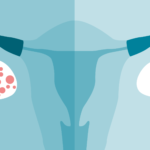Prolactin is a hormone produced by pituitary, a small gland situated at the base of brain, necessary for milk production after delivery. A small amount of prolactin is seen in both males and females.
Normal levels of prolactin are
In Males it is <20ng/ml
In Non-pregnant females it is <25ng/ml
In Pregnant females it is <80-400ng/ml
These levels are to be maintained within a limit for normal functioning of our body.
Increased prolactin level or decreased levels has its own health effects in our body. Decreased level causes inability to produce milk after childbirth. Increased level of prolactin causes galactorrhoea (milk production) in not pregnant or breastfeeding females and males.
What are the Functions of prolactin?
It helps to develop of breast tissues. It Stimulate the breast tissues to produce milk after child birth
Hyperprolactinemia
Increased levels of prolactin in blood is called as hyperprolactinemia.
It is normal to have an increased level of prolactin in blood during pregnancy and in new moms.
What Causes hyperprolactinemia?
1.Pituitary tumor (prolactinoma)
2. Underactive thyroid
3. Irritation to chest or chest injury
4. Pregnancy
5. Breastfeeding
6. Certain medications like antipsychotics, antihypertensive drugs, birth control pills.
7. Liver diseases
8. Diseases of hypothalamus.
9. Stress
10. PCOD
What are Signs and symptoms of hyperprolactinemia?
In females it may cause the following symptoms:
1. Irregular menses or absent menses (amenorrhea)
2. Milky discharge from breast when not pregnant or breastfeeding.
3. Breast tenderness
4. Infertility.
5. Vaginal dryness
6. Painful intercourse
7. Excessive body and facial hair growth.
8. Hot flashes
9. Vision problems
10. Headache
11. Low sex drive
In males increased prolactin may cause the following symptoms:
1. Galactorrhoea (milky discharge from breast)
2. Enlarged breast
3. Erectile dysfunction
4. Decreased libido (sex drive)
5. Infertility
6. Decreased body and facial hair
7. Headache
8. Visual disturbances.
How hyperprolactinemia causes infertility?
Females are more prone to hyperprolactinemia.
Increased Levels of prolactin hormone causes a decrease in gonadotropin-releasing hormone (GnRH). This is called as hypogonadotropic hypogonadism. GnRH is a hormone released from hypothalamus, which is essential for the production and release of sex hormones LH(luteinizing hormone) and FSH (follicle stimulating hormone) from anterior pituitary. LH and FSH are necessary for ovulation and menstruation. Thus Hyperprolactinemia causes missing of periods leading to absence ovulation, and hence infertility.
In males hyperprolactinemia causes decrease in GnRH . This in turn decreases LH and FSH which are necessary for normal sperm production (spermatogenesis ). Decrease libido and erectile dysfunction associated with decreased spermatogenesis leads to infertility in males.
How to diagnose Hyper prolactinemia Diagnosis
1. Blood test can be done to evaluate the level of prolactin.
2. TSH also will be tested along with it to find the cause of hyperprolactinemia
3. MRI can be done to locate and to measure the size of adenoma or prolactinoma if present.
How to treat prolactin related problems?
Surgery is used to remove prolactinoma if size is much larger.
Infertility can be managed effectively by homeopathy. Homeopathy has medicines to correct the prolactin level in males and females.
Homeopathic treatment is comparatively cost effective and has no side effects. Infertility due to any causes can be managed with non surgical,
non invasive techniques using homeopathic remedies. Homeopathic medicines are selected by doctors after thorough evaluation of all the symptoms presented by the patient. Individualistic Approach is done to every single patient.
Common Homeopathic remedies used to manage hyperprolactinemia are pituitarinum, peonia, urtica urensis etc.


